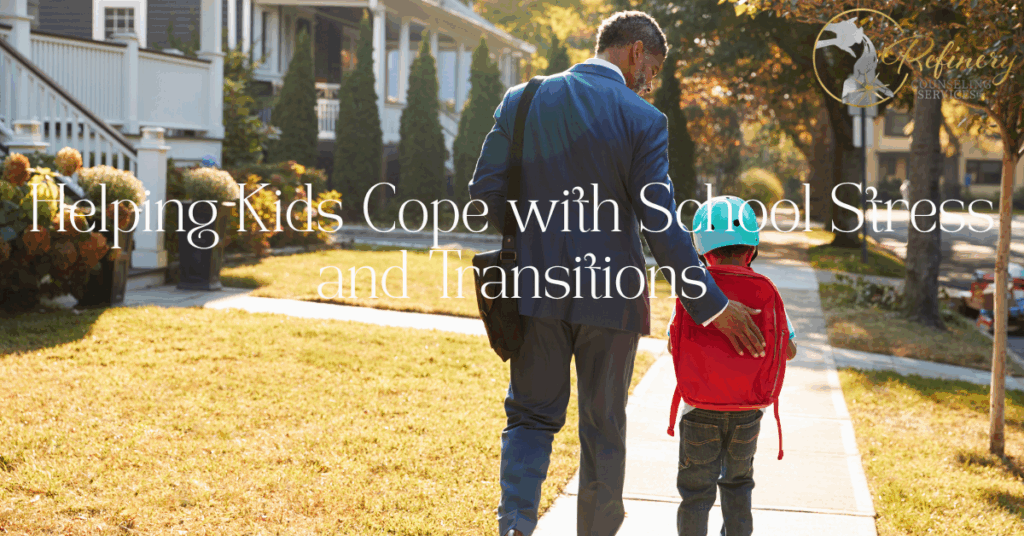The school years can be a joyful time of growth and discovery, but they can also bring stress, pressure, and uncertainty—especially during transitions. Whether a child is starting a new school year, moving up to a different grade level, transferring schools, or adjusting after a summer break, change can be emotionally taxing.
At Refinery Counseling Services, we often see how school-related stress affects children’s mental health and family dynamics. This article explores how to recognize signs of stress in kids, support them emotionally and spiritually, and offer tools that build resilience and calm.
Understanding the Sources of School Stress
Children experience stress for many reasons, including:
- Academic pressure: Tests, grades, and expectations can feel overwhelming.
- Social dynamics: Friendships, bullying, or loneliness can take an emotional toll.
- Routine changes: New teachers, classrooms, or school rules may create anxiety.
- Home transitions: Divorce, moves, or family changes often impact school behavior.
What may seem like a small shift to adults can feel like a major disruption to a child. That’s why early recognition and support are essential.
Signs a Child Might Be Struggling
Stress in children doesn’t always show up as tears or words. It often emerges through behavior, including:
- Irritability or emotional outbursts
- Changes in appetite or sleep
- School avoidance or stomachaches
- Withdrawal from friends or family
- Drop in academic performance
These are not signs of defiance. They are invitations for deeper attention and care.
Creating Safe Spaces at Home
Children thrive when they feel safe and seen. Here are ways to build emotional safety:
- Establish consistent routines to provide a sense of security.
- Make space for open conversations. Ask how school feels, not just how it’s going.
- Validate their emotions. “That sounds really hard” goes much further than “You’re fine.”
- Use rituals of connection. Evening check-ins, prayers before school, or family walks create moments of grounding.
If your child continues to struggle despite support, professional counseling may help. How to Recognize Mental Health Symptoms Early — And What to Do Next can guide you in identifying when outside support is needed.
Helping Kids Name Their Feelings
Children often act out feelings they don’t have words for. Teaching emotional vocabulary helps them:
- Identify what they’re feeling
- Understand that emotions are temporary
- Build empathy and problem-solving skills
Use tools like feelings charts, storytelling, or drawing to help them express what they may not yet have the language for.
Faith-Based Coping Strategies
When integrated with age-appropriate guidance, faith can offer powerful comfort:
- Pray together before the school day begins
- Share Scriptures that reinforce courage (e.g., Joshua 1:9)
- Remind children they are never alone
- Encourage them to talk to God when they feel nervous or unsure
God’s presence can be an anchor during times of uncertainty—for children and caregivers alike.
When Transitions Impact the Whole Family
School transitions can affect more than just the student. Parents often feel their own stress rise as they navigate schedules, expectations, and their child’s emotional needs. It’s important for caregivers to:
- Monitor their own stress and seek support
- Avoid transferring anxiety to their children
- Model healthy coping and calm communication
Therapy Is Not Just for Crises: 5 Myths About Mental Health Support speaks to the value of family counseling as a tool for emotional stability.
Partnering with Educators
You are your child’s biggest advocate. When stress arises, communicate with teachers, school counselors, or administrators:
- Ask about classroom behavior or changes in performance
- Request support services or academic accommodations if needed
- Share updates about home life that might impact your child’s school day
Healthy collaboration creates a more supportive learning environment.
Encouraging Resilience Over Perfection
Children don’t need to be perfect. They need to know they are loved, supported, and capable of growing through challenges.
Speak life over your child:
- “You are brave.”
- “Trying your best is enough.”
- “It’s okay to ask for help.”
- “God is with you in this.”
These affirmations remind them that their identity isn’t tied to performance but to who they are—a beloved child growing in grace.

